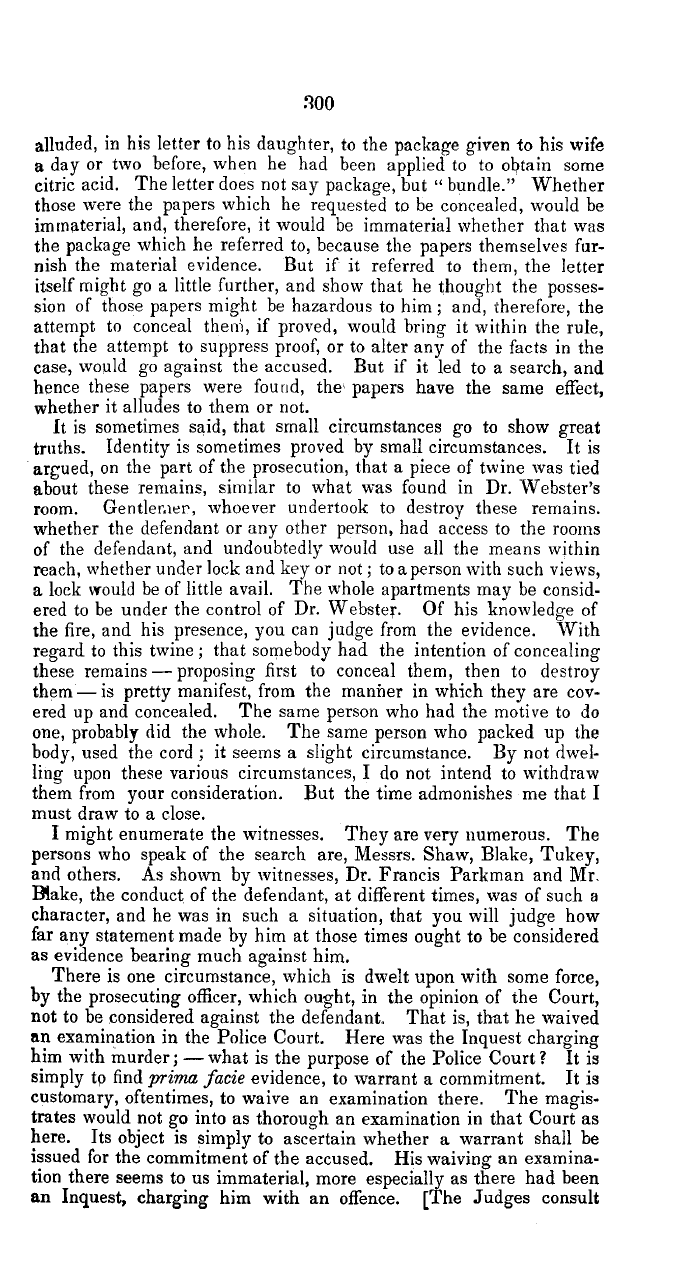|
:100
alluded, in his letter to his daughter, to the package given to his wife
a day or two before, when he had been applied to to obtain some
citric acid. The letter does not say package, but °° bundle." Whether
those were the papers which he requested to be concealed, would be
immaterial, and, therefore, it would be immaterial whether that was
the package which he referred to, because the papers themselves fur-
nish the material evidence. But if it referred to them, the letter
itself might go a little further, and show that he thought the posses-
sion of those papers might be hazardous to him; and, therefore, the
attempt to conceal them, if proved, would bring it within the rule,
that the attempt to suppress proof, or to alter any of the facts in the
case, would go against the accused. But if it led to a search, and
hence these papers were found, the papers have the same effect,
whether it alludes to them or not.
It is sometimes said, that small circumstances go to show great
truths. Identity is sometimes proved by small circumstances. It is
argued, on the part of the prosecution, that a piece of twine was tied
about these remains, similar to what was found in Dr. Webster's
room. Gentleraer, whoever undertook to destroy these remains.
whether the defendant or any other person, had access to the rooms
of the defendant, and undoubtedly would use all the means within
reach, whether under lock and key or not; to a person with such views,
a lock would be of little avail. The whole apartments may be consid-
ered to be under the control of Dr. Webster. Of his knowledge of
the fire, and his presence, you can judge from the evidence. With
regard to this twine; that somebody had the intention of concealing
these remains - proposing first to conceal them, then to destroy
them-is pretty manifest, from the manger in which they are cov-
ered up and concealed. The same person who had the motive to do
one, probably did the whole. The same person who packed up the
body, used the cord ; it seerns a slight circumstance. By not dwel-
ling upon these various circumstances, I do not intend to withdraw
them from your consideration. But the time admonishes me that I
must draw to a close.
I might enumerate the witnesses. They are very numerous. The
persons who speak of the search are, Messrs. Shaw, Blake, Tukey,
and others. As shown by witnesses, Dr. Francis Parkman and Mr.
Blake, the conduct of the defendant, at different times, was of such a
character, and he was in such a situation, that you will judge how
far any statement made by him at those times ought to be considered
as evidence bearing much against him.
There is one circumstance, which is dwelt upon with some force,
by the prosecuting officer, which ought, in the opinion of the Court,
not to be considered against the defendant. That is, that he waived
an examination in the Police Court. Here was the Inquest charging
him with murder;-what is the purpose of the Police Court? It is
simply to find prima facie evidence, to warrant a commitment. It is
customary, oftentimes, to waive an examination there. The magis-
trates would not go into as thorough an examination in that Court as
here. Its object is simply to ascertain whether a warrant shall be
issued for the commitment of the accused. His waiving an examina-
tion there seems to us immaterial, more especially as there had been
an Inquest, charging him with an offence. [The Judges consult
|

